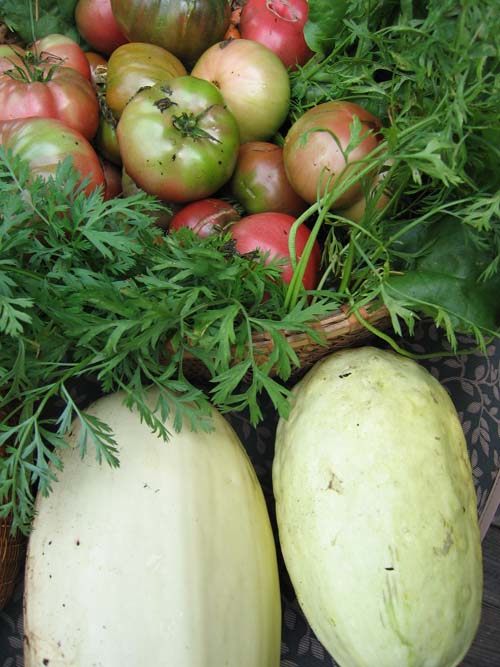71 bar rises 29.87 0mph NE dew-point 58 sunrise 6:00 sunset 8:38 Lughnasa
New (Corn) Moon
A vegetarian meal tonight. Spaghetti squash, golden beets, cucumber tomato and onion salad and cooked whole onion. Colorful and healthy. All but the tomatoes were from our garden, including the garlic and cilantro sauteed in olive oil as a dressing for the squash. After the OMG tomatoes the plants have settled into production with many fruits, but none mature right now.
I know some perhaps many of you who read this cook things straight out of your garden or meat from your stock, but I haven’t done it much. Flowers and shade plants, shrubs and trees have occupied my time. I love them and will always tend them but the vegetables now have my attention.
Primal eating happens when you go pluck five beets out of the earth, take them into the sink and wash them off, trim the leaves and roots away, then slice these hardy roots into smaller pieces, add tarragon and balsamic vinegar, some salt, cook and eat them. The same tonight with the spaghetti squash, the cucumber, the onion, both in the salad and the one I cooked whole. I knew these plants when they were tiny seeds, barely bigger than the lead in a pencil or when they were small potted specimens. The onions and the garlic went into the ground as what they would become, only larger. In each case though the same hands that harvested them prepared for eating.
10,000 years ago some hunters and gatherers first planted seeds and tended crops. The effect on human culture still gathers momentum even today. Nomadic life began to disappear for those people. Settled villages sprang up around the fields. The keeping of animals for food was more predictable than the hunt. In both cases though our ancestors had to give up the moving from place to place depending on season and game patterns. Our bodies, developed in the paleolithic to survive predators and hunt for prey, found themselves out of place.
They still do. So, while gathering and cooking goes far back in our history, it does not go all the way back to that earlier phase of the moveable feast. This fall, however, when Kate and I pick wild grapes that grow in our woods and turn them into jam we will travel back to those ancient times, the ancient trail of seeking food where it decides to be rather than where we care for it.
This meal tonight was a Lughnasa meal, a meal of first fruits, the harvest we do not plan to store either through drying or canning. As a Lughnasa meal, it put us in contact with those early Celts whose gardens might spell the difference between survival and starvation. We live in a wealthier time, but not in one any less dependent on the gifts of mother earth.

